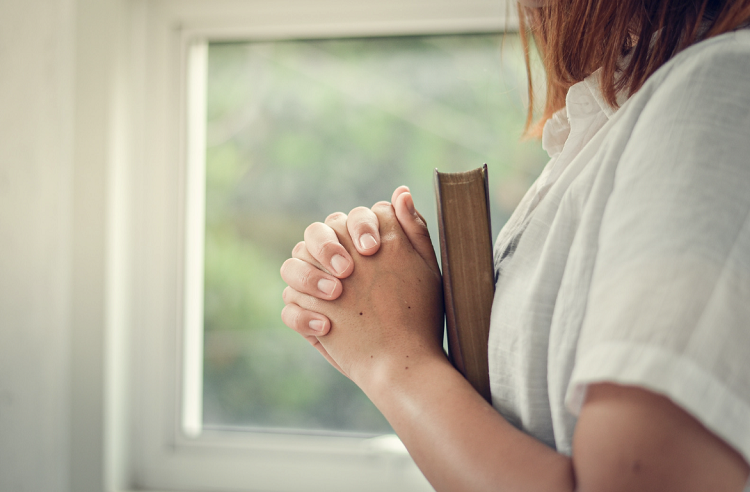My mother became a widow at a very young age, yet she remained an exceptionally virtuous person. She was gentle, meek, generous, and loyal, with few friends.
Of course, even when you did anything immoral, she would not blame you; she simply maintained her commitment to living a holy life. Her life was challenging and full of hardships. In her presence, even the slightest wrongdoing made you uneasy—not out of fear that she would report you, but because you dreaded her discerning gaze.
Before embracing Christianity, I had never felt proud of having such a mother. On the contrary, I felt ashamed—why could she not be more "normal"?
So, I went far away for college, intending to escape the influence of my "old-fashioned" mother. After graduation, I worked in Beijing, able to follow what I considered a "normal" path.
I decided to minimize contact with her as much as possible. I became obsessed with my figure and appearance, seeking health and nutrition. I often thought, "Such a wonderful body should not endure the slightest discomfort; I should make merry while I can!"
To enjoy life, we need money, but earning it the right way takes time. "No night grass, no fat horses." You have to use some unconventional methods." So, in the process of thinking, "Doing this will not cause too much harm," slowly, "Once a person sins, they develop harmful habits. Their conscience gradually dies, and the heart becomes increasingly hardened."
In the initial years, I lived a "carefree" life, indulging in things my mother hadn't done, eating what she had not, experiencing what she had not seen, playing in ways she had not played, and wearing what she had not worn. In essence, I was living vindictively, retaliating against the "passive" adherence to her principles that had once deprived me of varied experiences..
I felt very smart because I often made the "right choices." However, the price I paid for frequently making the "right choices" was extreme anxiety and a profound sense of insecurity.
Originally, I made every choice intended to cater to my flesh, thinking, "I can indulge in anything, but I must never suffer a loss!" However, the outcome often turned out to be that, in the end, not only did I suffer losses, but there was also significant harm to my physical well-being.
Then, I missed my mother and wanted to call her, reach out, and see her. After some contemplation, I finally gave up. I believed she had a "characteristic" that particularly attracted misfortune," which was "terrible luck."
I did not believe in her God, and the moment I heard, "I am a sinner, under the dominion of sin, but only in the Lord is there true peace and true freedom," I became upset. Am I not free now?! Becoming a Christian and not being able to do things as I please makes me feel like I have lost my freedom! I even stubbornly believed, "If she did not believe in God, she would not have experienced these hardships!"
I developed severe depression, and we ended up living together again. She preached the gospel to me, but I cursed her God, believing that my current predicament was because her God "disliked me," with a growing resentment towards God.
One day, while she was listening to a sermon, I overheard, "Say to them, 'As surely as I live, declares the Sovereign Lord, I take no pleasure in the death of the wicked, but rather that they turn from their ways and live.'" (Ezekiel 33:11)
It seemed like it was time for me to reevaluate my "perspective," but so many things had gone wrong in my life. Would God accept me? I began reading the Bible and saw a variety of imperfect, even unworthy, individuals described in it, yet they were blessed. I should be able to as well.
That night, I prayed for the first time, and surprisingly, it was answered. All the agitation, complaints, sorrow, and self-doubt in my 'chaotic' life and all kinds of negative emotions began to leave me.
I began to rely on prayer; it changed nothing, yet it changed everything. As I delved deeper, I knew that I had to confess. But I worried because, for so many years, I had always refused to recall. Confession requires recollection, and I was genuinely afraid.
After hesitating for a long time, I finally decided to confess. My heart was in turmoil as I attempted to recall the past, but it was not as terrifying or heart-wrenching as I had previously thought. I remembered a quote I had read earlier: 'Christianity is the only religion that can deal with a person's past,' and this turned out to be true.
Confessing is so simple; all you need to do is 'find your way back.' No matter how deeply you have fallen or how messed up your life is, you can cut ties with the past. When you come to Jesus, you can be completely forgiven through His 'once and for all' sacrifice, receive a new heart and a new spirit, and enjoy a beautiful relationship with God.
(The original article is published by the Gospel Times and the author is a Christian from Liaoning.)
- Translated by Nonye Nancy












